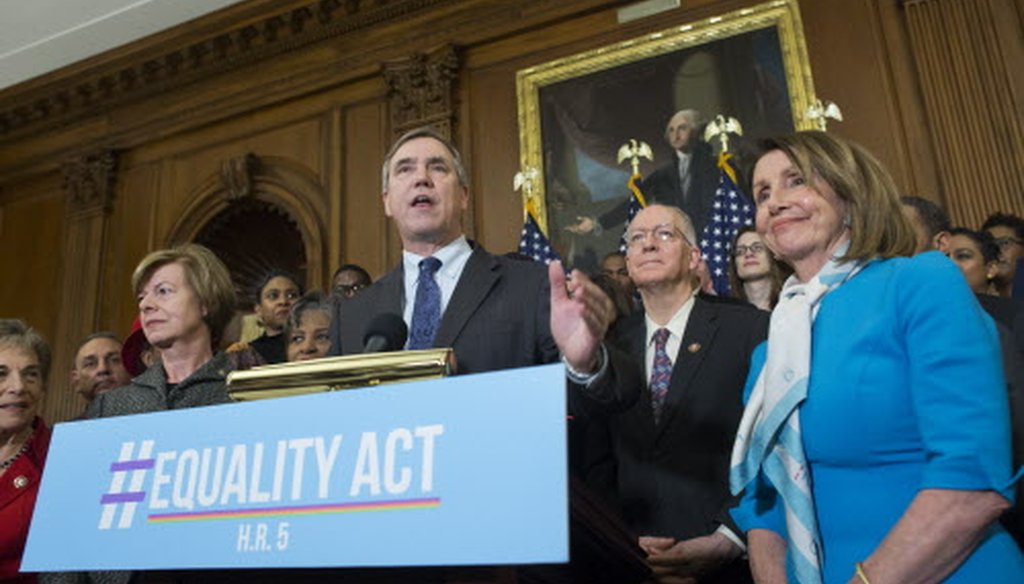



Oregon Sen. Jeff Merkley (center) comments during an event to introduce the Equality Act March 13, 2019 in Washington. Also attending is Wisconsin Sen. Tammy Baldwin (left) and House Speaker Nancy Pelosi. (Michael Reynolds)
Congressional Democrats recently introduced the Equality Act, a bill aimed at expanding existing civil rights legislation to ban discrimination against LGBTQ people in employment, housing, education, credit and other aspects of life.
In arguing for the measure, U.S. Sen. Tammy Baldwin of Wisconsin noted that in much of the country there is little legal protection for such individuals.
Baldwin was the first openly gay member of the Senate. In 2018, U.S. Sen. Kyrsten Sinema of Arizona became the first bisexual member. The two are the body’s only LGBTQ members.
"The Equality Act recognizes the fact that more than half of the states in the United States do not have legal protections for people preventing or giving them the tools to fight back against discrimination on the basis of sexual orientation and gender identity," Baldwin told Jonathan Van Ness on the March 12, 2019 episode of his "Getting Curious" podcast.
Specifically, Baldwin claimed that 29 states lack "comprehensive protections" for LGBTQ individuals.
In 2015, the U.S. Supreme Court ruled that bans on gay marriage were unconstitutional. And Wisconsin has included protections from discrimination against sex and sexual orientation since 1982, becoming the first state to enact these laws. (Wisconsin did not go as far to fully protect transgender people, as PolitiFact Wisconsin found in 2015.)
Is Baldwin right about other states?
The Equality Act proposal
The Equality Act was first introduced in the House in 2015 and is an updated version of one introduced in 1974, which aimed to extend the Civil Rights Act of 1964 to prohibit discrimination on the account of "sex, marital status, or sexual orientation in places of public accommodation."
The new version extends the 1974 law to add gender identity, defining it "as gender-related identity, appearance, mannerisms, or characteristics, regardless of the individual’s designated sex at birth," which would include transgender individuals.
The places where discrimination is specifically prohibited are also extended, adding in gyms, stores, banks, travel agencies and more.
Supporters of the measure say it’s a step toward full equality for the LGBTQ community, while some conservative opponents say the bill is a threat to religious liberty and free speech -- particularly for those who choose to run businesses in accordance with their religious beliefs.
The state of the states
As of today, 21 states and Washington D.C. have laws that prohibit discrimination against sexual orientation and gender identity, according to Movement Advancement Project, a nonprofit advocacy group for equal rights. The group compiled its data from existing state statutes.
Wisconsin prohibits sexual orientation discrimination but doesn’t go as far to address gender identity. Thus, it is not counted among the 21.
Of course, if 21 states have such protections, then 29 would not.
"Currently, federal anti-discrimination statutes such as Title VII (Civil Rights Act of 1964) which prohibits discrimination in the employment context do not on their face prohibit sexual orientation or gender identity discrimination," said Adam Romero, a professor at the University of California, Los Angeles School of Law. "The statutes don't say the words sexual orientation or gender identity."
Thus, as it stands, LGBTQ individuals living in states that have anti-discrimination laws have stronger civil rights protections than those who don’t. Some may also be covered by city or county ordinances that prohibit discrimination.
Indeed, those living in states without such provisions face even less protection.
"If you live in California, you have protections from employment discrimination or Nevada or New Mexico and these other states," Romero said. "But, if you live in Texas or Oklahoma or Florida, or the many other states without these state statutes, you are not protected under state law from discrimination (based on) sexual orientation or gender identity under these state statutes.
"The Equality Act would benefit all LGBTQ people across the country but it would be especially beneficial to those living in states without state level protections."
Our rating
Baldwin claimed 29 states don’t have comprehensive protections for LGBTQ people. The number is on the money, based on our conversation with Romero and other researched data on state statutes.
We rate Baldwin’s claim True.
Getting Curious with Jonathan Van Ness, How do we find our voice? With Tammy Baldwin, March 12, 2019
NBC News, ‘We need to pass the Equality Act’: Sen. Tammy Baldwin makes case for LGBTQ bill, March 11, 2019
NBC News, Democrats reintroduce Equality Act to ban LGBTQ discrimination, March 13, 2019
Phone interview with Adam Romero, March 27, 2019
Movement Advancement Project, Non-discrimination laws
NBC News, More than 100 faith leaders unite to denounce Tennessee GOP’s ‘slate of hate’, March 27, 2019
House Bill, Equality Act, 1974
Senate Bill, Equality Act, 2017
PolitiFact, No gender identity protection in Wisconsin anti-discrimination law, Democratic chair candidate says, May 8, 2015
In a world of wild talk and fake news, help us stand up for the facts.
